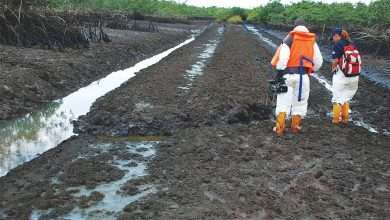Japa: A Growth Accelerator FG Sees From Distorted Lens – By Emma Okolie
As Nollywood continues to help tell Nigeria’s unique stories and win more converts abroad; and as afrobeat lit up more dance floors in the world’s major cities and popularize our pidgin English, some Nigerians abroad say that this is the best time to be a Nigerian. The success of the country’s entertainment industry is also pushing diaspora Nigerians to set or achieve new goals. This is not 1982 when Andrew wanted to “check out” on his own without any concrete connection or unique skill set to make it abroad. The current Japa generation are being encouraged to move abroad by friends and families with solid success stories.
Tobias Ekwu, who is based in Aberdeen
Scotland, and on holiday in Port Harcourt, says that more Nigerians are studying for higher degrees, learning new trades and engaging in new business ventures to improve their social status. “Nigerian nos abroad want to improve themselves because they feel that it is the only way to move up the social ladder,’ he says. “Nigerians abroad no longer accept what life threw at them. They want to prove to people that they are Nigerians; they want people to know that they stand for excellence and success.”
The problem is that the Nigerian government appears not to have fully recognized that diasporas are social capitals that can help attract foreign direct investments. They can help boost the country’s trade and make the country to prosper. The general impression is that the country is not yet ready to fully benefit from Nigerians in diaspora.
Let’s begin with the hostile disposition of embassy staff during emergencies that could affect the chances of Nigerians to remain in their Japa country of choice, or get deported, jailed or lose their jobs. The clumsy manner some embassy staff handle such issues has caused many Nigerians their jobs, career, promotion and deportation.
Some observers have linked their attitude to work to the carryover mentality of the country’s inept civil service. Nigerians abroad always complain that some embassy staff have turned the embassies to places of helplessness and hopelessness during troubled times, rather than places of support and rescue. By law, embassies are to protect the interests of the citizens at all times, especially during evacuation situations caused by conflicts or when a citizen had been a victim of serious crime or illness. There have been cases when the renewal or replacement of passport took up to weeks or even months.
Irrespective of these barriers, Nigerians will continue to leave the country in large numbers. The worsening state of the economy and the attendant hardship make them believe they can achieve their dreams abroad. This embarrasses the government because no well-intentioned country wants it’s doctors and other highly qualified professionals to leave for work abroad.
To discourage more Nigerians form leaving, the Federal Government wants to create more jobs. The minister of state for Science, Technology and Innovation, Henry Ikoh, said the government intends to rectify this trend through industrialization in a statement released in Abuja. ”If we collaborate and synergize in the area of human capital development, it would guarantee industrialisation, when people are gainfully employed and moved out from poverty, then Africans and Nigerians would not be struggling to travel abroad because everything is here.”
There are talks in government circles that some Nigerians have started returning on their own after many years of living abroad. Such Nigerians are coming back home with technical know-hows to fit into their plans.
What the government has failed to realize is that some of the well-off Nigerians that have left or about to leave the country, especially the highly qualified professionals will still study in elite schools abroad and become “strategic assets” whose resources and influence can benefit the country.
Nigerians blazing trails abroad
The government has a duty to to discourage it’s best brains from migrating by creating jobs and the enabling environment for businesses to thrive. It is also the duty of government to provide security and protect lives and properties at all times. There is need for the government to first address the issues that discourage people from staying before discouraging people from leaving. People have the freedom to achieve their goals in any corner of the globe.
Meanwhile, as the government discourages people from leaving, it has ignored the success rate of Nigerians abroad, and their remittances to the country. At a town hall meeting with Nigerians in the diaspora on the sidelines of the 78th United Nations General Assembly (UNGA) meeting in New York, President Muhammadu Buhari revealed that the sum of $20 billion that was remitted to Nigeria in 2021, represents four times the Foreign Direct Investment(FDI), into the country, under the same period.
According to the World Bank Migration and Remittance Brief, Nigeria gets the largest inflow of remittances in Sub-Saharan Africa with 65 per cent of its total and 2 per cent of global inflow. Then compare it with the $89.4 billion India got from it’s diasporans in 2021. According to the World Bank, India was the top recipient globally in 2021. “Remittance flows to India were enhanced by the wage hikes and a strong labor market in the United States.”
In 2020, despite the pandemic, India achieved over $83.3 billion, according to the World Bank. Over the last few years, Indians have taken high-skilled jobs in high-income countries such as the United States, United Kingdom, and Singapore — from low-skilled employment in Gulf countries such as Saudi Arabia, Kuwait and Qatar, the World Bank added. The biggest gain India has made is the contributions of Indian-Americans in replicating Silicon Valley in India, which has led to the proliferation of start-ups in technology.
The Japa league
Nigerians leave the country for various reasons. Some for studies, others to aquire highly specialized skills. There are a few others who leave because they have the means to travel abroad for pleasure. They own holiday homes or stay in five star hotels or luxurious rental villas to cool off. They are in the class of the wealthy and powerful, whose investments earn them respect and privileges in the host country.
Generally, most Nigerians leave for economic reasons. And wherever they find themselves, they meet other Nigerians and grow the network of the country’s diaspora. These networks of town unions, professional associations, university alumni or state associations sometimes provide support to the newly-arrived facing one challenge or the other. They help them to settle down to a new life. Yearly, some of these associations execute projects back home; fund the education of students through scholarship programmes and also sponsor medical missions back home.
The major problem is the country’s inability to properly utilize the connections and resources of the diaspora networks. Their contributions to investments, enterprise and employment don’t reflect their true capacity.
Since the Nigerians in Diaspora Commission (NiDCOM) birthed in 2019, it’s engagements with Nigerians abroad have not attracted the expected high profile investments and trade.
The African Union sees the diaspora as the Sixth Region of Africa that should play a key role in achieving the AU Agenda 2063. With Nigerians scattered across the globe, and making impact in various fields, by now the county should be agog with investments. In May, 2021, the Federal Government launched the National Diaspora Policy (NDP) to collaborate with Nigerians in the Diaspora for the country’s growth and development. But how far is the Federal Government willing to go to protect the various interests and concerns of Nigerians abroad?
A large percentage of Nigerians in the US, Canada, the United Kingdom, and several other Western countries are known for their relentless zeal to aquire a university degree. That is besides the fact that they are also making key contributions in other areas to fund their education. They are seen as very hardworking people who are committed to whatever they have set out to achieve.
The perception of foreign nationals as expatriates or economic refugees depend largely on the government’s actions or pronouncements towards its citizens abroad. When the federal government that ought to protect it’s citizens at all times, allows prejudiced countries to wrongly label Nigerians as criminals because of the actions of a few bad apples, then Nigerians in diaspora will feel exposed and abandoned. No matter the magnitude of offence a citizen may have committed, governments stand by their innocence until a decent and transparent trial proves otherwise. Even when found guilty, governments don’t watch them rot in jail or refuse to put in a fight if it’s death penalty.
For example, on December 8, 2022, Washington and Moscow swapped two high profile prisoners: Viktor Bout, a notorious Russian arms dealer, who had been in American prison upon arrest in 2008, and Britney Garner, the US women’s basketball star convicted of carrying marijuana oil through Moscow in February, 2022. Bout had spent a total of 14 years in prison before Washington swapped him for Britney Grimer. What the swap deal shows is that countries don’t abandon their own irrespective of the crime their citizen has committed.
We have to consider the contributions of Turkish nationals abroad to the country’s GDP. Although, Turkey like Nigeria is an emerging market economy; it is also an industrialized country. The World Bank classifies Turkey as an upper-middle income country in terms of it’s per capita GDP. Both Germany and Turkey have an emigration corridor that dates back decades ago. Germany was facing labour shortages in 1962 and turned to Turkish workers for succour. They were supposed to return to Turkey after completing their work. But they remained. Sixty one years after about three million people with Turkish roots live in Germany. The Turkish government is not preventing or discouraging it’s citizens from heading to Germany. It sees them as economic capitals that are free to work anywhere and contribute to the Turkish economy.




